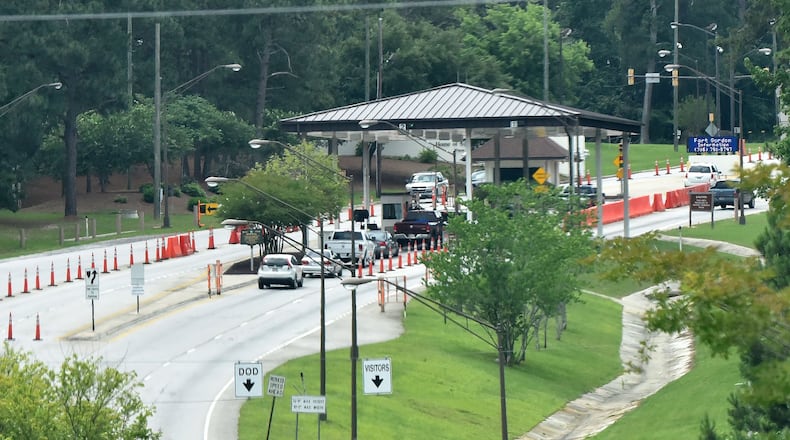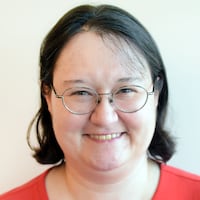Before her arrest in the National Security Agency leak investigation drew headlines around the world this week, Reality Leigh Winner worked here, a major hub in the government's sprawling intelligence-gathering network.
Thousands of code breakers, cyber security researchers, intelligence analysts, IT experts and other specialists — military members and private contract employees — work in the intelligence community on Fort Gordon, which includes an NSA installation, and more are on their way.
In November, the U.S. Army broke ground on its new Cyber Command, which will open its first phase in 2018. Fortune magazine in April listed Augusta as one of the seven cities in the world that “could become the world’s cybersecurity capital.”
As Winner's story unfolded this week, reporters from major networks and newspapers across the country descended here. But few people attached to the military installation would talk on the record. The NSA declined to comment. Local government officials were also tight-lipped.
“I don’t think it can be understated what the growth at Fort Gordon has meant for Augusta but also for the entire region,” said Deke Copenhaver, a former mayor of Augusta who now hosts a radio show and runs a consulting business. Copenhaver called news of Winner’s arrest “an unfortunate situation” that’s “not really a reflection on Augusta.”
“Knowing people in cyber industry and working with them a lot,” he said, “you can’t prevent totally rogue actors.”
The allegations surrounding Winner were a surprise, said Pam Tucker, who previously directed the Emergency Management Agency in the Augusta suburb of Columbia County.
“I’m really very shocked that somebody would leak information, as well-vetted as their employees are,” said Tucker, who is running to lead the county commission. “It kind of makes you realize that anything can slip through the cracks.”
‘New front for war fighting’
The U.S. Justice Department announced her arrest Monday, about an hour after The Intercept reported that it had obtained a top-secret NSA report about Russia's interference. The intelligence report, according to The Intercept, says Russian military intelligence officials tried to hack into the U.S. voting system just before last November's election.
Winner previously worked as a linguist in the U.S. Air Force and speaks Arabic and Farsi, according to her stepfather. The government said Winner was employed by a military contractor, Pluribus International Corp., in Augusta and had access to the top-secret NSA report. She reportedly worked at Fort Gordon.
Named after Confederate General and former Georgia Gov. John Gordon, the fort traces its roots back to the original Camp Gordon outside Atlanta. The installation, reconstituted outside Augusta during World War II, got heavily involved in intelligence-gathering when the Signal Corps training center opened in 1948. The NSA started operating in the Augusta area in the 1990s with a relatively small outpost at the fort.
Today, Fort Gordon is home to a major NSA command, the NSA/CSS Georgia Cryptologic Center. It reportedly houses some 4,000 workers. Also known by the codename “Sweet Tea,” the center intercepts and decodes communications from Europe, North Africa and the Middle East.
All told, an estimated 9,800 people work in cyber or information technology jobs at the fort, said William Hatcher, director of Augusta University’s Master of Public Administration program and one of the researchers conducting a study of the area’s burgeoning cyber industry. That’s about 5 percent of the Augusta metro area’s workforce, he said.
Then-Army Secretary Eric Fanning told the AJC in November that the cyber command was one of the Army’s most important national security investments. The command will coordinate with NSA to both protect the military from cyber assault, but also to protect civilian targets.
“It’s a new front for war fighting, and in my mind it’s every bit as important as air, land, space or sea,” Fanning said at the time. “Cyber cuts across everything in the military and civilian world.”
The existence of NSA Georgia is not a national secret — the NSA has a press release about it on its website. But news of just what happens there is very tightly controlled.
The NSA let the local news media into the building for the 2012 ribbon-cutting ceremony, but no cameras were allowed, WRDW News 12 said.
“The closest our camera was allowed was 2 miles away from the new building,” an online article said.
In 2008, two ex-military intercept operators talked to ABC News about their work at Fort Gordon, saying they listened in on phone calls made in the Middle East. ABC said the ex-operators told the network they “routinely intercepted and ‘collected on’ phone calls placed in the Middle East to friends and family” back in the U.S., including “U.S. military officers, American journalists and American aid workers.”
The allegation raised privacy concerns and contradicted statements by American military and intelligence leaders that U.S. technology was not being used to listen in on Americans.
Whatever does happen at the NSA’s Augusta facility, the agency has signaled that it is making a difference. When the new facility opened in 2012, then-U.S. Cyber Command chief Gen. Keith Alexander said NSA Georgia had won the agency’s Travis Trophy six times. The NSA, which Alexander also went on to lead, described the honor as “an annual award presented to those whose activities have made a significant contribution to NSA/CSS’s mission.”
‘Important part of the community’
In December 2013, the Augusta area further burnished its intelligence credentials, when the U.S. Army announced it was relocating its Cyber Command there from the Washington, D.C., area. That relocation is expected to trigger the moves of potentially thousands of private-sector contractors to support the Army command over the next several years.
Credit: Hyosub Shin
Credit: Hyosub Shin
Meanwhile, companies such as Unisys and Raytheon have invested tens of millions of dollars expanding facilities in the Augusta area.
In January, Gov. Nathan Deal announced plans for the Georgia Cyber Innovation and Training Center, a state-run school designed to teach students and educators how to combat hacking and other forms of cyberwarfare. The state facility along the Savannah River in downtown Augusta will be part of the Augusta University campus and was planned in conjunction with the Department of Defense and the NSA.
Bobby Culpepper, a businessman and mayor of the small city of Harlem, not far from Fort Gordon, said the southern part of Columbia County has seen explosive growth thanks to expansion at the post.
Culpepper’s city of more than 2,600 has seen old buildings that sat empty for years become targets for investors. One group bought an old Masonic Temple and is converting it into a handful of apartments and commercial space. DeFoor Realty, where Culpepper works, bought an early 1900s bank for a new office.
“Most little small towns would [kill] to have growth,” Culpepper said, “because most of them are dying. What we have coming — it certainly brings challenges, but it brings tons of opportunities.”
Hatcher, who is studying the area’s cyber industry, said he doubted that news of an intelligence employee leaking top-secret documents could tarnish Augusta’s cyber reputation.
“In the long run, it’s going to be difficult to counterbalance the growth that’s going on with cyber-jobs in this area,” he said, “because we have a strong foundation with Cyber Command growing here and then also the growth that’s going on out in the private sector around the community.”
Staff writers Johnny Edwards and Jennifer Peebles contributed to this report.
Keep Reading
The Latest
Featured






